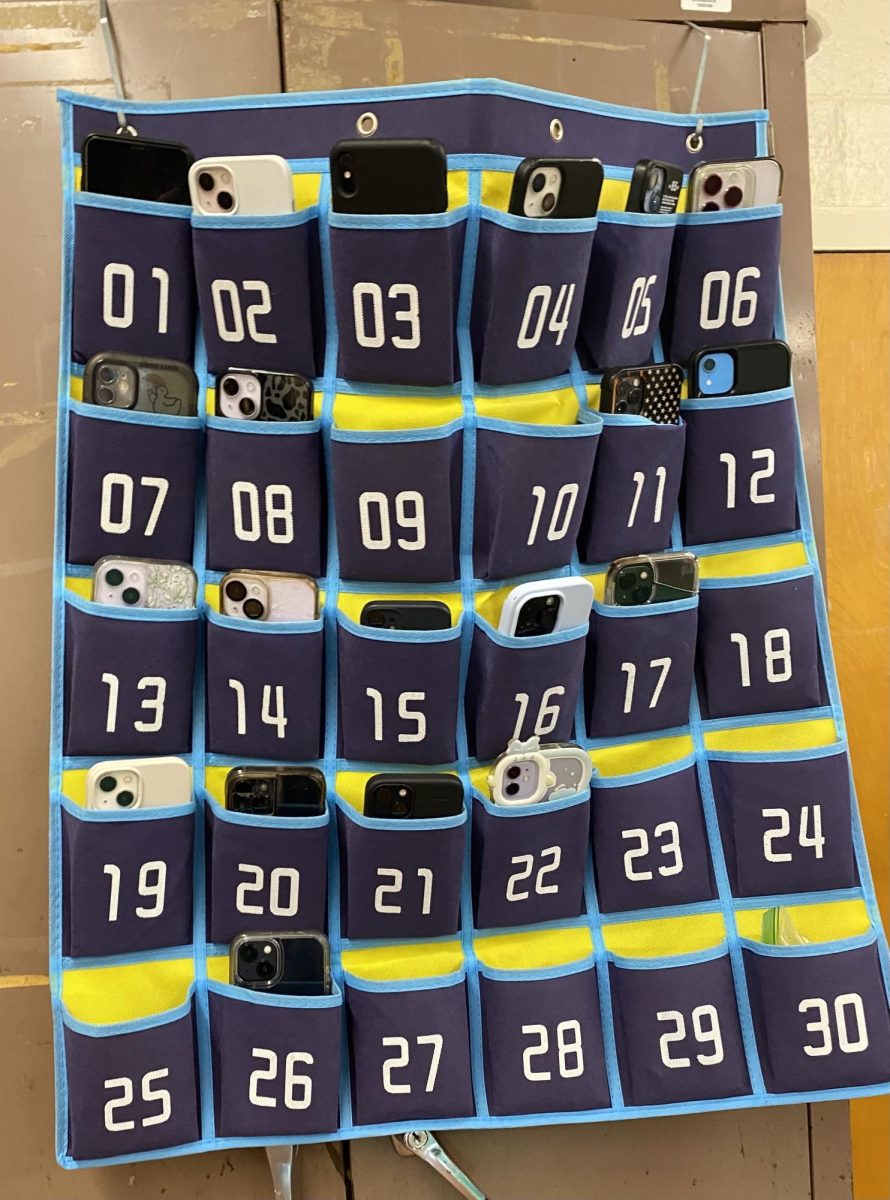Throughout school, some teachers have implemented a system known as a ‘phone jail’ where students’ phones are collected as soon as they walk into class and returned when the bell rings. The phone jail is a hanging organizer with phone-sized pockets labeled with numbers.
Many students are left dissatisfied with this mandate. Because this rule applies to all students—including those who don’t use their phones in class—this can be seen as an unnecessary punishment by some students.
“Even though I would ask students to put their phones away, […] they would still be using them at certain times throughout the classroom,” said health teacher Catherine Bongo-Liselli.
Of course, teachers with phone jails use it because they believe it’s in their students’ best interest.
“…I found that students were very distracted by their phones, and it also seemed like it was a real burden for them, […] like they couldn’t concentrate, and they were so worried about what was coming in on their phones that I felt like it was a disadvantage to them,” said English teacher Annmarie Marusevich.
Using a phone jail can help students to be focused, not compelled to check their phones.
“I really see students paying attention more, without a doubt. […] I see students more engaged than before,” said Bongo-Liselli.
Some teachers who utilize phone jails in their classrooms prefer a different name, such as a “phone hotel,” because they don’t want students to be averse to using it due to negative connotations.
“…I’ve been really happy with the phone jail as students call it. I don’t like to think of it that way,” said Marusevich.
Additionally, teachers who use phone jails don’t use them with the intention of irritating students because they wouldn’t want to possibly hinder a student-teacher relationship.
“A downside would be that from the student’s point of view, it is annoying, […] so whatever kind of relationship we have is a little strained,” said Bongo-Liselli.
Teachers who currently use phone jails are satisfied with the decrease in distractions for students and the increase in productivity.
“I’ve had nothing but what I would consider to be success,” said Marusevich.
Generally, teachers who have phone jails use them because they feel it benefits students in the long run, even if they are unable to realize that as of now.
On the contrary, some teachers don’t have phone jails in their classrooms.
“I’ve had students in the past, even when I’ve confiscated certain phones, try to take somebody else’s phone. […] I don’t trust it because I’m not always watching [the phone jail], and I don’t want something to happen,” said math teacher Lynn VanSchaick.
Some teachers who don’t use phone jails don’t want to be responsible for the damage or misuse of a student’s phone. Not using a phone jail would ensure no student can walk away with another student’s phone, whether it be intentional or accidental. Using a phone jail also runs the risk of students forgetting their phones in class.
However, even teachers who don’t have phone jails understand why other teachers utilize them.
“If I knew students could keep their hands off of other people’s [phones] and it would just stay in the phone jail, then they would be paying attention more in class…,” said VanSchaick.
Some students believe someone’s phone should only be taken away if the teacher has an adequate reason, such as a student constantly using it in class.
“Students aren’t happy about [the “phone jails]. …It’s almost like when a mother is telling a kid to do something, and they’re mad at them,” said Bongo-Liselli.
Most students aren’t in support of phone jails being used for the entire class but rather only for students who don’t abide by the rules.
“I think using a phone jail for students who don’t use their phones in class is like a punishment, and following the rules shouldn’t be punished,” said sophomore Emma M. 🔳










